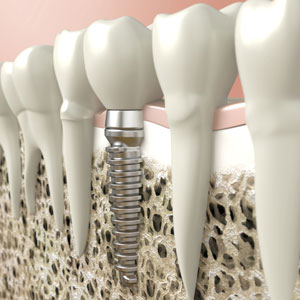Dental Implants at Shenton Park Family Dental
Implants are used for replacing missing teeth. Perhaps you have a congenitally missing tooth or lost one in an injury. Regardless of the reason, implants offer one of the best solutions for restoring your smile’s function and appearance.
What Are Dental Implants?
 An implant is essentially a biocompatible, titanium screw. This material is hypoallergenic and completely safe to the human body. It’s placed directly into the location of the missing tooth, stimulating the bone to integrate with the implant’s surface. This process is called ‘osseointegration’ and it permanently fuses the implant into the jaw.
An implant is essentially a biocompatible, titanium screw. This material is hypoallergenic and completely safe to the human body. It’s placed directly into the location of the missing tooth, stimulating the bone to integrate with the implant’s surface. This process is called ‘osseointegration’ and it permanently fuses the implant into the jaw.
After an implant is installed, we’ll place something over it to replicate the visible and functional area of your new ‘tooth’. The most common restoration is a crown but we can also use a pair of implants to support a dental bridge. It’s even an option to use implants to stabilise or anchor a denture into place on top of them.
Implants vs. Other Options
Dental implants are considered the gold standard for replacing missing teeth. They don’t rely on other teeth for support (they stand independently) and promote healthy bone levels. When installed, their stability adds additional reinforcement to the teeth around them, keeping your overall bite aligned.
Today’s implants have an extremely high success rate. Up to 95% of them can last well over 25 years or more. Much of it depends on factors such as home care and oral hygiene habits. We highly recommend scheduling regular recall appointments and professional cleans to prevent gum infections around your new implants. That way we can intervene early when necessary before any major problems develop.
Some dental implant cases are quite simple while others are more complex. We provide in-house implant installation and guidance for our patients who may require coordination for more specialised treatment needs. During your evaluation we’ll discuss your needs, best options and outline a care plan that fits your specific case.
Does it hurt to get dental implants?
Dental implant placement is relatively minimally invasive for most straightforward cases. It can usually be performed with a small amount of local anaesthetic to numb the site immediately around where the implant is being installed.
Depending on the number of teeth that are missing and how many implants you’re getting, we may recommend a single implant with an individual crown, a pair of implants with a fixed dental bridge or a set of implants to support a full-arch hybrid prosthesis or denture.
Implants require extra time for the bone in your jaw to fully integrate with their surface. This process is what makes implant therapy so predictable; rushing through the integration phase could result in failure of the overall treatment. Typically it’s best to allow the implant anywhere from 3-6 months to integrate before a fixed restoration is installed.
It’s essential that your mouth is healthy and has adequate bone support to install the implant at that specific location. Existing infections such as gum disease or severe bone loss must be ruled out. Additionally, implants are not designed for younger individuals whose mouths are still growing and developing.
Reserve Your Consultation Today
Have missing teeth? Find out if dental implants are right for you! Contact us today to reserve an appointment.
CONTACT US »
Any invasive or surgical procedure may carry risks. Before moving forward, it is recommended that you seek a second opinion from an appropriately licensed medical professional.
